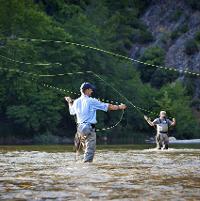As academics, industry leaders, and policymakers explore innovative approaches for promoting health and well-being across the life course, renewed attention to outdoor activities offers a not-so-new, and perhaps an underutilised, means of support. For centuries, fly fishing has connected people to the natural world, and to each other. In the UK, this tradition reaches back to at least the 15th century with Dame Juliana Berners’ Treatyse of Fysshynge wyth an Angle, a pioneering work that helped shape angling as both art and reflection. Later, Izaak Walton’s The Compleat Angler (1653) further entrenched the pastime in English cultural heritage, portraying fishing as an exercise not merely of sport but of philosophy, friendship, and contemplation.
Today, in a world increasingly dominated by screens and the pursuit of the next-best tech, fly fishing remains a powerful counterpoint, one with growing relevance for our ageing societies. As a researcher focused on healthy ageing, and as someone who has spent a fair amount of time on the water in my native Canada and some (but not nearly enough) time on British waters, I've come to appreciate fishing not just as a pastime, but as a personal resource for health and wellbeing.
Fly fishing is something I do for myself, but also as an intergenerational social activity. For me and my dad, it has long been a cornerstone of our relationship. We’ve spent decades chasing salmonids together across British Columbia, the Yukon, and Alaska, but in recent years, with my father living with dementia, our time on the water has shifted its priorities and meaning. These days, catching fish is very much secondary. What matters more is the overall experience of the trip and creating moments of joy for my dad. The act of reading water along the riverbank, the careful ritual of choosing flies, shared flasks of hot coffee on frigid mornings, and riverside meals punctuated by laughter, are what makes these trips. These are moments of calm, clarity, and connection that, I believe, have an intergenerational appeal and relevance as health-promoting behaviors.
This isn’t just anecdote. A growing body of research supports what many anglers intuitively know: recreational angling may offer significant mental and physical health benefits for older adults. A UK study found that frequent participation in recreational angling was associated with significantly lower odds of depression, schizophrenia, suicidal ideation, and self-harm, alongside higher overall mental well-being and reduced symptoms of depression and anxiety in those who fished more frequently.
Importantly, the act of fly fishing can be highly adaptable and accessible. For older adults with mobility limitations or cognitive impairments, the activity can be modified to suit their needs. Access to the water can be adjusted to differing mobility capabilities, boats with specialized ramps can be employed, and the gear itself can be tailored to suit different skillsets and capabilities. In the case of my dad, as he’s gotten older, we select runs that have easier wading, furnish him with a wading stick, and put him in spots where the casting is more straightforward. The act of fishing is not just about putting fish in the net, it’s about being present, immersed in the moment. In a study involving a focus group with military veterans, participants identified several therapeutic benefits of fly fishing. These included providing a reprieve from the psychological strain of PTSD, supporting sustained coping and emotional resilience, helping to restore a sense of control by alleviating symptoms, and offering a meaningful context for personal transformation and post-traumatic growth.
But fly fishing is not necessarily a solitary pursuit. Whether joining a community programme, participating in a club, or simply sharing a day on the water with family and friends, the social dimension of angling is powerful. Social isolation and loneliness, which disproportionately affects older adults, is increasingly a serious public health concern. Fishing offers a solution that is quiet, non-stigmatizing, and naturally intergenerational.
I’ve seen this in my own life. Fly fishing has allowed me not only to stay connected with my father but also to share the experience across generations and communities. It fosters ample opportunities for intergenerational mentorship, storytelling, and a kind of quiet companionship that’s increasingly rare in today’s digital world. Anecdotally, some of my favourite memories are times spent with family and friends on the water across age groups. This is supported by a 2023 systematic review examining the impacts of intergenerational engagement on older adults’ cognitive, social, and health outcomes, which found a range of potential benefits—most notably in reducing anxiety, enhancing generativity, improving cross-age attitudes, and increasing levels of physical activity. Fly fishing, with its low barrier to entry and deep cultural roots, is particularly suited to these intergenerational exchanges.
At one point in time catching fish was the primary objective but as I’ve gotten older I’ve realized that, it’s the time on the water, the socializing, and the people I fish with who keep me coming back. The real success is not in the catch, but in the time spent together, something fly fishing delivers in abundance. Henry David Thoreau may have put it best when he said: "Many men go fishing all their lives without knowing that it is not fish they are after".
About the Author
Theodore D Cosco joined the Oxford Institute of Population Ageing in 2016 as a Research Fellow. Dr. Cosco is a Chartered Psychologist (British Psychological Society) trained in applied social research methods (MSc 2011, Trinity College Dublin) and epidemiology (PhD 2015, University of Cambridge), and Assistant Professor of Mental Health and Aging in the Department of Gerontology, Simon Fraser University. His research interests include resilience, mental health, and the interface between technology and healthy ageing.
Opinions of the blogger is their own and not endorsed by the Institute
Comments Welcome: We welcome your comments on this or any of the Institute's blog posts. Please feel free to email comments to be posted on your behalf to administrator@ageing.ox.ac.uk or use the Disqus facility linked below.













